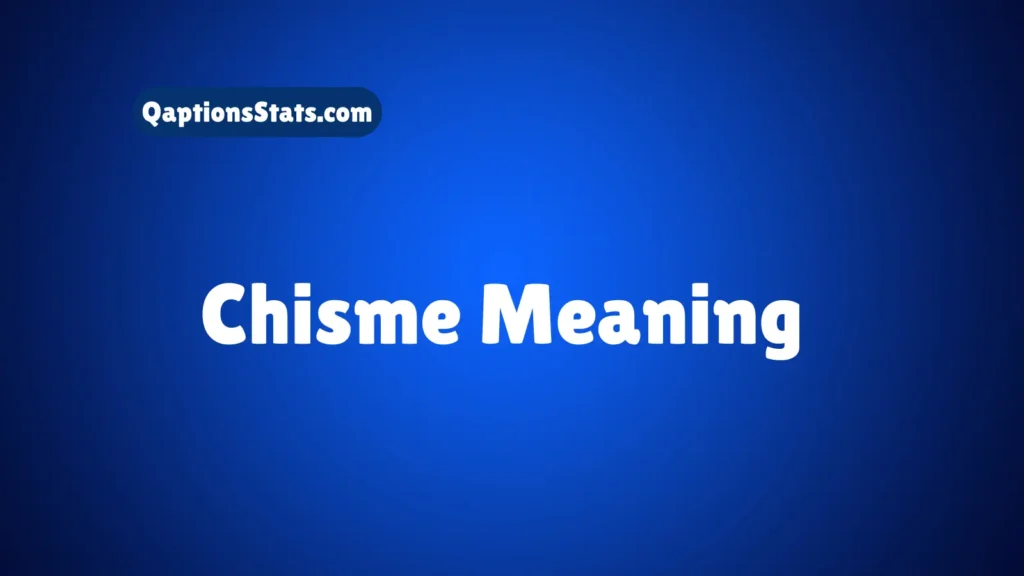In the rich tapestry of language and culture, certain words transcend their literal definitions to embody deeper societal values and practices. One such term is “chisme,” a Spanish word commonly translated as “gossip.” However, within Latin American communities, chisme encompasses more than idle talk; it serves as a conduit for connection, cultural preservation, and communal solidarity.
This article delves into the multifaceted meaning of chisme, exploring its cultural significance, linguistic variations, and the contexts in which it operates. By understanding chisme beyond its surface-level interpretation, we gain insight into the social dynamics that shape communication within Latin American societies.
Defining Chisme

At its core, “chisme” refers to gossip or rumors, particularly those concerning personal or private affairs. It is derived from the Spanish language, where it originally denoted idle chatter or talk. Over time, chisme evolved to signify the act of sharing information, often informally, about individuals or events within a community.
While in English, gossip often carries a negative connotation associated with malicious intent or triviality, chisme in Latin American cultures is perceived differently. It is not merely about spreading rumors; it is a means of storytelling, information dissemination, and social bonding.
Related post: Dapper Meaning (Hiatus Meaning)
Cultural Significance of Chisme
A Tool for Connection
In many Latin American communities, chisme functions as a social glue, fostering connections among individuals. Engaging in chisme allows people to stay informed about communal happenings, from family events to neighborhood developments. This exchange of information often occurs in informal settings such as family gatherings, local markets, or social clubs, where storytelling is a cherished tradition.
Preservation of Oral Traditions
Chisme plays a role in preserving oral traditions and cultural narratives. Through the sharing of stories, customs, and experiences, communities maintain a collective memory and identity. This oral transmission ensures that cultural values and histories are passed down through generations, reinforcing a sense of belonging and continuity.
Empowerment and Solidarity
For marginalized groups, particularly women, chisme can serve as a form of empowerment and solidarity. It provides a space for individuals to voice concerns, share experiences, and support one another. In environments where formal channels of communication may be limited, chisme becomes a vital means of expression and community building.
Related post: Bombaclat Meaning: Origins, Usage, and Cultural Significance
Linguistic Variations and Usage
Regional Synonyms
The term “chisme” has various synonyms across different Spanish-speaking regions, reflecting the linguistic diversity within the language:
- Cotilleo: Commonly used in Spain.
- Bochinche: Popular in Puerto Rico.
- Cotorreo: Used in Mexico.
- Chambre: Found in Guatemala.
- Cahuín: Used in Chile.
These regional variations highlight the widespread nature of gossip as a social practice, adapted to local linguistic and cultural contexts.
Read also: Ligma Meaning: Understanding the Internet Meme and Its Cultural Impact
Grammatical Forms
In Spanish, “chisme” can function as different parts of speech:
- Noun: El chisme (the gossip).
- Verb: Chismear (to gossip).
- Adjective: Chismoso/a (gossipy).
This flexibility allows for nuanced expression and reflects the integral role of gossip in daily communication.
Contextual Applications of Chisme
Informal Settings
In casual environments, such as family dinners or friendly gatherings, chisme serves as a form of entertainment and social engagement. Sharing stories about mutual acquaintances or community events fosters camaraderie and keeps individuals connected to their social circles.
Professional Environments
While chisme is often associated with informal settings, it also permeates professional environments. Workplace gossip can influence team dynamics, morale, and organizational culture. Understanding the nature and impact of chisme in professional contexts is essential for maintaining a healthy work environment.
Media and Popular Culture
Chisme has a prominent presence in media and popular culture, particularly in tabloids, talk shows, and social media platforms. Celebrity gossip, for instance, captivates audiences and drives media consumption. This phenomenon underscores the universal appeal of storytelling and the human interest in the lives of others.
Ethical Considerations
While chisme can foster connection and community, it also raises ethical considerations. The dissemination of false or harmful information can damage reputations and relationships. It is important to approach gossip with discernment, ensuring that the sharing of information is respectful and considerate of others’ privacy.
Conclusion
“Chisme” embodies a complex interplay of communication, culture, and community. Far from being mere idle talk, it serves as a vehicle for connection, cultural preservation, and social cohesion within Latin American societies. By appreciating the multifaceted nature of chisme, we gain a deeper understanding of the social fabric that binds communities together.



